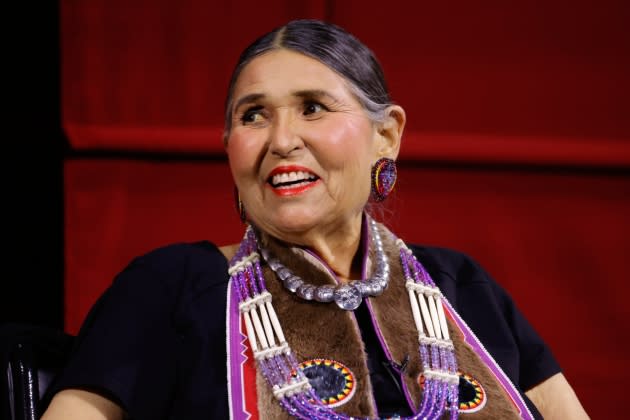‘I Was Representing All Indigenous Voices’: Sacheen Littlefeather Reflects on Declining Brando’s Oscar, Accepts Academy Apology
- Oops!Something went wrong.Please try again later.
- Oops!Something went wrong.Please try again later.

Sacheen Littlefeather, the Native American civil rights activist who declined Marlon Brando’s 1973 Best Actor Oscar on his behalf, discussed that famous night and the Academy of the Motion Picture Arts and Sciences’ recent apology for the way she was treated at an event in her honor over the weekend.
Littlefeather’s speech has loomed large in Oscar history: After Brando won the Best Actor prize for his turn in The Godfather, Littlefeather took the stage and, at Brando’s request, declined the award and spoke instead about the stereotyping of Native Americans in film and TV, as well as the South Dakota Wounded Knee protest. Littlefeather’s speech was met with boos and jeers; she was threatened with arrest and later claimed that John Wayne tried to “physically assault” her.
More from Rolling Stone
Taylor Swift's 'All Too Well,' Kendrick Lamar Short Film Eligible for 2023 Oscars
'SNL': Benedict Cumberbatch Takes on Oscars Slap in Opening Monologue
Nearly 50 years later, the Academy formally apologized to Littlefeather in a private statement in June. The apology was announced publicly in August, and over the weekend, the Academy held an event in her honor, “An Evening with Sacheen Littlefeather.”
In conversation with Academy member Bird Runningwater, Littlefeather remembered the night with equal amounts of gravity and humor. She joked about seeing some of her favorite actors in the crowd, like Lee Bowman and Roger Moore, and quipped that she kept her non-acceptance speech “under 60 seconds.” But she also touched on the commotion going on behind the stage, which she later learned was six security guards holding back a furious Wayne.
“Now that was the most violent act that ever took place at the Academy Awards,” Littlefeather said, adding that when she walked backstage, she heard people mocking Native American chants and saw others doing the tomahawk chop. “I just kept walking, in dignity, to the four different press rooms that I went to. And then, after that, I held my head high, and I left with a car that was waiting for me.”
After Runningwater noted that Littlefeather gave one of, if not the first, political speeches at the Oscars, she said, “I didn’t represent myself — I was representing all indigenous voices out there. All indigenous people. Because we have never been heard in that way before.”
Along with her conversation with Runningwater, Littlefeather shared a short speech in response to the Academy’s apology. Speaking of the challenges she and other indigenous people were facing in an “impractical society that deliberately set out to erase the existence and diversity of Native peoples through genocide and oppression,” Littlefeather said she accepted Brando’s request knowing “the impact and importance of representing all Native people on that night.”
She added: “I am here accepting this apology, not only for me alone, but as acknowledgement, knowing that was not only for me, but for all of our Nations, that also need to hear and deserve this apology tonight.” After asking all the Native people in the audience to stand, Littlefeather continued, “Be proud that we stand as survivors — all of us. Please, when I am gone, always be reminded that whenever you stand for your truth, you will be keeping your voice, and the voices of our Nations and our people alive.”
Best of Rolling Stone
